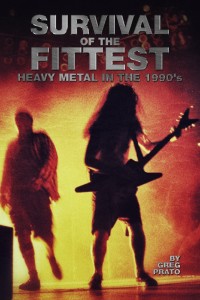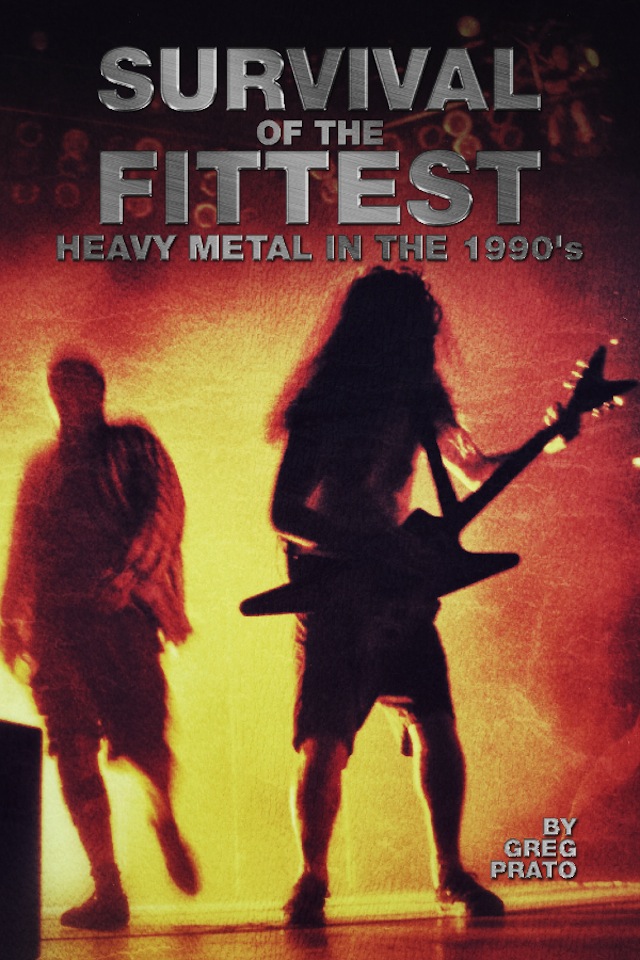NEW BOOK, “SURVIVAL OF THE FITTEST: HEAVY METAL IN THE 1990’s,” TELLS THE STORY OF ONE OF THE GENRE’S MOST DIFFICULT DECADES
 Since its inception in the late 1960’s, heavy metal has experienced quite a few ups and downs in popularity. But there was one specific decade that sticks out as the most troubling – the 1990’s. In what seemed like one fell swoop, a style of metal that had been popular for much of the 1980’s was rendered obsolete, and in its place, was a much more real, raw, and unique approach – detected in several new metal-based “sub-genres.” Add to it several changes in the music industry and media, and it appeared as if traditional metal may have met its expiration date…before several bands (and a certain traveling festival tour) helped put headbanging rock back on track.
Since its inception in the late 1960’s, heavy metal has experienced quite a few ups and downs in popularity. But there was one specific decade that sticks out as the most troubling – the 1990’s. In what seemed like one fell swoop, a style of metal that had been popular for much of the 1980’s was rendered obsolete, and in its place, was a much more real, raw, and unique approach – detected in several new metal-based “sub-genres.” Add to it several changes in the music industry and media, and it appeared as if traditional metal may have met its expiration date…before several bands (and a certain traveling festival tour) helped put headbanging rock back on track.
Written by journalist/author Greg Prato, Survival of the Fittest: Heavy Metal in the 1990’s is the first book to focus entirely on this decade. Set in an oral history format, Survival features over 80 interviews conducted exclusively for this book, including current or past members of Pantera, Sepultura, Fear Factory, Judas Priest, Iron Maiden, Kiss, Def Leppard, Guns N’ Roses, Slayer, Megadeth, Anthrax, Exodus, Testament, Dream Theater, King’s X, Extreme, Winger, Cinderella, Living Color, Faith No More, Primus, Nirvana, Nine Inch Nails, White Zombie, Stone Temple Pilots, Kyuss, Danzig, Clutch, Life of Agony, Biohazard, Type O Negative, Within Temptation, Cradle of Filth, Death, Coal Chamber, and System of a Down (among many others), as well as Eddie Trunk, Riki Rachtman, and Lonn Friend. Also featured is a foreword penned by Pantera bassist Rex Brown.
Available as a paperback version [616 pages, $24.99], a Kindle download [$9.99], and a Nook download [$9.99], ‘Survival of the Fittest’ helps put the ’90s and heavy metal all into perspective.
Read an exclusive excerpt here.
Ordering info:
Greg Prato is a Long Island, New York-based journalist, who has written for Rolling Stone and Guitar Player, and has authored such books as Iron Maiden: ’80 ’81, The Faith No More & Mr. Bungle Companion, The Eric Carr Story, and Grunge is Dead: The Oral History of Seattle Rock Music. Survival of the Fittest is his 16th book overall.







I’m looking forward to reading this, but I hope it’s not all just comments on how everything changed. There should also be a celebration of what was good in that decade, because a lot of great 90s music has been overlooked. Accept did some great albums, Rainbow’s Stranger in Us All, Deep Purple’s Purpendicular, Rush’s Counterparts, the UFO reunion with Schenker, Royal Hunt’s live album in Japan, Ratt did a cool reunion. Come on, Eddie, time to play that stuff on your radio shows!
And a P.S. for Kiss: Carnival of Souls grows on me every time I listen to it. The euphoria over the reunion overlooks that Kiss was well-prepared to make relevant music in the 90s.
I also like COS, but if you think that album was going to sell at that time to a Kiss audience you are dreaming. Kiss was not doing well then and the label knew it, which is why that album was buried and the reunion happened and saved the entire band.
True…but just like The Elder, there are some gems…those two albums came at the wrong times. I always felt bad for Bruce Kulick and Singer (until he got back in the band) for the timing of COS because it was the wrong audience and the reunion overtones were rampant thru that albums release, so it never got its due…The Elder is an album you do late in your career when you just don’t give a shit, not when you’re trying to revamp your bands career…
But then there’s no risk involved, and that they took such a risk, is what makes that album great. After The Elder, they pretty much made the same formula for five records in a row, the best being Animalize. You seem like a simpleton.
I’ve consistently played what I thought was good and my audience wanted for 33 years regardless of trends and still do
I really liked the changes in music that occurred in the 90s, NuMetal is a very viable form, and once that had its own foothold alongside grunge, which I am not that crazy about, I was all in. “Beg to Differ” is probably the first Nu Metal release, that’s a solid album, and Nu Metal just got better, more musical, better songs, as the decade came to a close in 2004. Eras for music have a different time schedule than linear time. So, “the 80s” started in 1978 with The Cars’ first record, and Van Halens’, and ended in 1989 with Warrant’s first record. “The 90s” started in 1990 but ended in 2004, with “Lost and Found.” The older bands had a tough time acclimating, some did pretty good, like Kiss, who somehow appropriate a currency to their own unique brand. Others, not so much, hello pretty much all of the bands that sprung out of the 80s. Dysfunction was one of the most unpleasant experiences I’ve ever had with an album, it goes on forever, something like 78 minutes! and it’s like seeing Donald Trump acting like a hippie, eating tofu. Maybe if they called themselves “The Traveling Blue Fish” and Don had some dreads and George sported a Fu Manchu mustache. Blackie, on the other hand, did some of his best work in the 90s.
Sometimes the 90’s is made out to be worse than it was. Metal didn’t die, it just had to evolve or else it would suffer the fate of becoming a fad. The poofy-hairded mascara bands had made metal in some ways look kind of dumb and cartoonish. Times were changing and it became adapt or be left behind. Pantera is a great example of a band making a change and taking on a harder, more urgent stance with their music and look how they ruled in the 90’s. Maybe it was just people wanting music with more to it than style. That’s why bands like Soundgarden, Alice In Chains, Pearljam and Nirvana connected with people. Bands like Korn and Tool wouldn’t have had a prayer of making it in the 80’s. Some of my all-time favorite albums are from the 90’s, like Pantera’s “Far Beyond Driven”, Trouble’s “Manic Frustration”, Prong’s “Beg To Differ”, Rollins Band’s “End Of Silence”, Down’s “NOLA”, Sevendust’s “Animosity “, Sepultura’s “Chaos A.D.” and Corrosion Of Conformity’s “Deliverance” just to name a few. And lets not forget the 90’s saw the classic Kiss and Black Sabbath lineps reunite and get back out and kick ass. And this was also the decade Ozzfest started. Metal was still around, it just became more of an exclusive club than it had been before. MTV and record companies passed the judgement that metal wasn’t cool in the 90’s and people who blindly followed that advice moved on. It was for the best because, after all the casual fans were weeded out, what was left was us diehard fans. Metal is a music form and lifestyle that you commit to for life, who cares what decade it is.
Good points on the 90’s reunions…I agree too that the 90’s birthed some excellent bands, Soundgarden being one of them…
Looking back, metal as a genre needed to go through some sort of cleanup. The glam era got overblown and saturated with mediocre talent, and it seemed like every band with a pretty boy lineup (under several pounds of hairspray, makeup and spandex) got a record deal and airplay on MTV (or should that be called “cableplay”?). The shame of it was a lot of genuinely good bands that didn’t need the glam look got swept away with the backlash when grunge and nu-metal took over. I never really got on board with 90’s bands, except for Alice In Chains, Soundgarden to some extent, and early Pantera (they kind of lost me after “Far Beyond Driven”). I stuck with Rush, Judas Priest (yes, even with Ripper), Metallica (even through the Load/ReLoad disappointment), Megadeth, Slayer, Anthrax… mostly the bands I was already into that managed to carry on. I couldn’t stomach the Iron Maiden albums with Blaze though, that just didn’t work at all for me.
While I agree that the market got over saturated, and there were some silly bands out there, I will still take the 80’s, over the 90’s, any day. But, to each their own.
D from ET.com 🙂
There was a lot of good and a lot of bad in the 90s. First of all, some of the greatest metal albums in HISTORY were released in 1990: Painkiller and Rust in Peace.
Halford left Priest = devastating. However, we got Fight. We saw the birth of Korn, which IMO, used to be brilliant. Their first few albums are extraordinary. We saw the rise of Pantera, to incredible heights beginning around 1990 or so, as well. So, it wasn’t all bad!